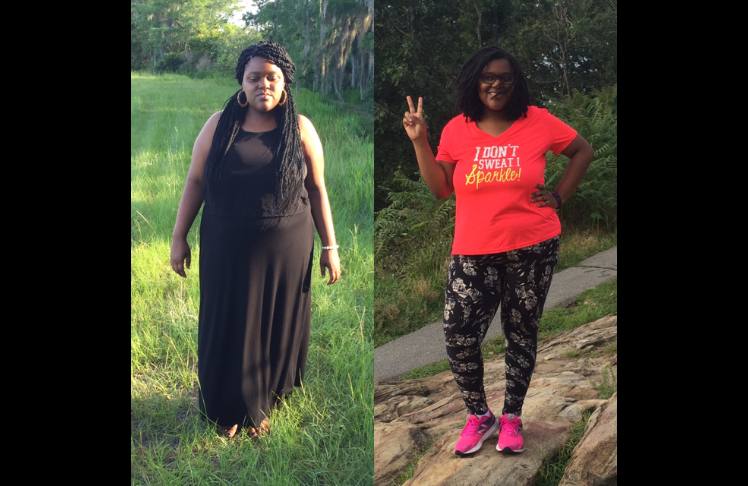
by Alexa Spencer
Raven Paris, 30, spent most of high school tormented by her menstrual cycle. She never knew if it’d come monthly or not, how much pain it’d bring, or if she’d be able to manage the abnormally heavy blood flow.
“I was like, ‘I don’t want to get bullied or picked on for bleeding through my clothes, so I’m going to just wear extra pads and a tampon,’” she recalls.
But that didn’t stop her peers from teasing her.
“I remember people saying it looked like I had on a diaper, so, what social life? I was very isolated outside of my tiny friend group for the most part,” she says.
The Bankridge, Georgia, resident visited multiple doctors to figure out what was causing her crippling periods. They told her to lose weight or go on birth control. It wasn’t until adulthood that she learned she had polycystic ovary syndrome (PCOS), an endocrine disorder where there is an excess of the male sex hormone — androgen.
“I always say that my journey began with me being misdiagnosed, which is pretty common among Black people. I had to go to many different doctors or providers before getting the proper testing and diagnosis,” she says.
The Causes and Symptoms of PCOS
Common symptoms of PCOS include irregular periods, infertility, unexplained weight gain, insulin resistance, and unwanted hair. Women with the condition may have cysts on their ovaries, but this is not the case for everyone.

PCOS is the most common endocrine system disorder among premenopausal women. Nationwide, 6% to 12% — or as many as five million — women of reproductive age in the United States are impacted by it. “But it’s a lot more than that,” according to the Centers for Disease Control and Prevention. The condition can continue beyond childbearing years and raise the risk for other health problems, such as diabetes and high blood pressure.
Although little is known about racial disparities in PCOS, research shows that Black people are disproportionately exposed to endocrine disruptors — chemicals that interfere with the body’s hormones.
Jonene Ford, a clinical nutritionist based in Rockville, Maryland, who treats PCOS, says endocrine disruptors can be anything from chemicals used to treat water to plastic food packaging.
“It could also be the skincare products that we use. There’s been a lot of more recent research about Black hair care products containing endocrine disruptors,” Ford, 43, says.
Genetics may also play a part in the onset of PCOS.
Adopting a Holistic Lifestyle
While there is no known cure for PCOS, the symptoms can be managed through nutrition, diet, and exercise changes. Pharmaceutical medicine, such as birth control, is also an option. Metformin, a medicine used to treat diabetes, and anti-androgen medicine are available. Neither are approved by the U.S. Food and Drug Administration, and the latter may cause complications during pregnancy, according to the U.S. Department of Health and Human Services.
Paris had previously experienced negative side effects from birth control pills, so after being diagnosed at 22, she chose a natural route for treatment. She turned vegan for a year, eliminating meat and dairy, among other changes.
“[I started] doing detox baths with Epsom salt, essential oils, castor oil pads, drinking red raspberry tea, and spearmint tea. I went gluten-free and ate very low amounts of soy because those really seemed to affect me negatively,” Paris says.

She also switched to chlorine-free menstrual products. After a year of a “holistic lifestyle change,” Paris says her cycle became regular.
“Eventually, they got to like 30 days apart where I would have a healthy cycle, where it wasn’t extreme bleeding. I could still function while I was on my cycle instead of being confined to the bed or having to call out of work,” she says.
She was also able to naturally conceive her son and first child instead of having to do in vitro fertilization (IVF) or any other type of reproductive assistance.
Natural Medicine Stigma
Paris’ success didn’t come without pushback from people around her.
“I had friends I went to school with and coworkers who were like, ‘Why do you feel like you need to do all of this? Why won’t you just take the medicine?’…It’s just like people didn’t understand why I felt like I was called to holistic healing,” she says.
With over 20 years of experience administering natural medicine, Ford says people often discount its legitimacy because they don’t understand it.
“I don’t think that it’s malicious,” she says. “I think that people, generally speaking, don’t understand holistic medicine, and because they don’t understand it, it’s kind of like they reject it. Oddly enough, I don’t think people understand Western medicine either. It’s just like they trust it blindly.”

American society has a desire to achieve quick results, Ford says. But that’s a convenience holistic medicine can’t always offer. The results will come, but at a slower pace because “we’re working with the body’s natural processes.”
“Whereas Western medicine acts almost like a bandaid. [It] kind of turns off systems for other systems to be able to work better. I think there is a time and place for that, but for conditions such as PCOS, I think they’re much better managed with time, consistency, and intention,” Ford says.
Her practice, Ford Wellness, creates individualized plans for women with PCOS that address nutrition, sleep, stress, and exercise.
“Even though I make it kind of seem simple, for a lot of people, we’re talking about making major changes to their lifestyles…I meet whoever, wherever they are, and we work together to figure out a path that will work for their life to help them manage their condition.”















